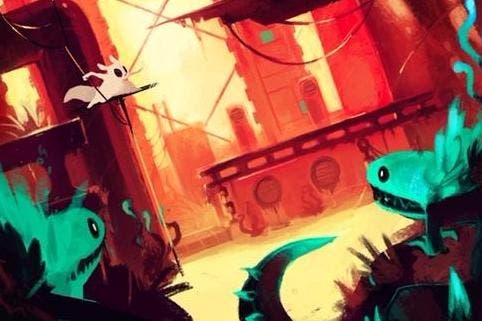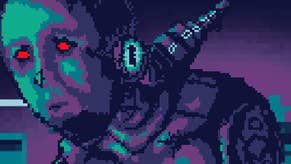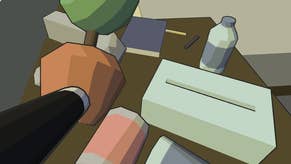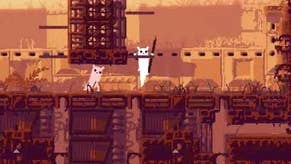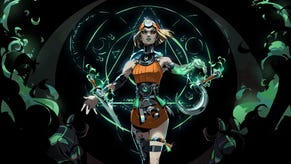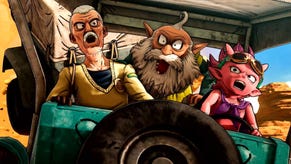Rain World review
Take the weather with you.
Pity the slugcat, a creature that has never before managed to step from the shadow of the grander, more celebrated mythical chimeras: the griffins, the centaurs, the Tricos. In part, that's because its arrangement of animal parts is peculiarly grotesque: the twitching feline nose and inquisitive ears mashed incongruously with the fat slimy torso of a common slug. But there's also a question of temperament. The griffin is part-lion, part-eagle, an apex predator squared, and as such can afford to be known. The slugcat, by contrast, sits just couple of links from the bottom of the food chain, able to catch bats and bluebottles, but otherwise hunted by just about every other carnivore on the block. No wonder the slugcat is absent from Greek myth: his survival depends upon anonymity.
In Rain World, a post-apocalyptic, tumbledown city of steel rafters, rusty poles and weed-clogged drainpipes, you soon learn the value of maintaining a low profile as a slugcat. The city is overrun with luminous crocodiles, vultures, ravenous plants and a growing menagerie of other predatory horrors, with their slick, whipping tails and flapping jaws. You quickly learn to slurp through pipes and quiver beneath ferns, only emerging to grab and munch on a passing bat when you're certain that you're otherwise safe and alone. With your brilliant white fur, you stand out a mile in this grey city. Slugcat has been separated from his family to boot. As such, you are not only noticeable, but isolated.
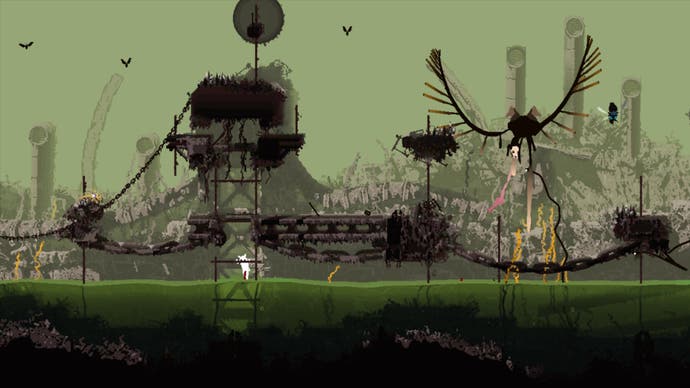
As soon as a predator eyes you, it charges, jack-knifing over curbs in an effort to grab you in its jaws. If you fail to escape, it's an immediate game over. Rain World's unkind designers then send you way back to the last safe space - usually a prison-cell-sized nook, somewhere deep below ground, or inside a forsaken building. There are no Dark Souls-esque drops to reclaim from the site of your death. You have nothing to show for your lost progress, save for the mental map you may have accrued of the area, the usefulness of which is then undercut by the fact that the placement of enemies dynamically shifts on each reload.
Like Tokyo Jungle, Rain World is a savage survival game, in which you play as a nomadic animal in a post-human city. The world is explored via a vast grid of static screens, between which you move, either by walking or, if you're being careful, by squeezing through the warren of interlocking pipes. It is an almost wordless game, the designers preferring to let you feel out your objectives, the game's arcane systems, and the various and mind-jumbling effects of food through doing rather than reading. Like all those without a home, you soon figure out the most pressing to-dos in your hierarchy of needs: find food, then find shelter. Each scrap you eat fills a single 'dot' in your hunger meter, which must be four-pips full before you can settle down for the night if and when you find a hibernation den, which doubles as a respawn point.
The atmosphere is stark and sinister, its industrial aesthetic (as if Trent Reznor had started moonlighting as a brutalist pixel art) elegant but also often too hard to read. The place has a dingy yet pleasing style, one that's echoed by the loose, naturalist movement of both slugcat, who leaps from pole to platform with a floppy grace, and the lolloping vultures and alligators that pursue him. In the hands, it takes time to adjust to slugcat's imprecise and inconsistent movements. His wrap-around body means that slugcat can, while falling from even a great height, grab a passing pole with the right directional input. But for those raised on Super Mario's crisp, reliable leaps, it's a disorientating devolution of platforming ability. When combined with the copious boltholes, into which you often squidge by accident while aiming for a pipe positioned a few pixels to their left or right, the game's controls move from eccentric to plain ineffectual.
There is hope, however. Evolution is an unexplained system at the core of the game. Eat food and hibernate and slugcat will evolve, one step up the evolutionary ladder at a time. Die and choose to 'continue', rather than 'exit', and you'll be knocked back an evolutionary step. In time, you reach areas of the map that can only be traversed when you are appropriately evolved. In this way, slugcat's chances of progress are yoked, not only to space, but also to levelling. It's a twist on the Metroidvania template, which typically gates access to the farther reaches of a map via a lock and key system. Here, however, the keys are no physical objects that you find in the game, or abilities that you unlock permanently, but fluid assets that can be lost as quickly as they're gained.
You are not entirely vulnerable in this world, however. As well as slugcat's talent for hiding, he can also pick up and throw objects (spears, for example, can be hurled at predators, or used to create impromptu ledges to scale sheer walls). Sticks and stones, however, will do nothing to protect you from the deadliest threat: the rain. Water falls sporadically and lethally: fail to make it to a safe spot, and it's another game over. These demanding rhythms have, in recent years, proven popular, both through Hidetaka Miyazaki's oeuvre, and the fashionable Rogue-like as a pleasing stakes-heightening threat. Rain World shows how the design is only effective when paired with careful check-pointing, reliable enemy placement and tight controls.
Rain World, for all its stark beauty, feels overly punitive. As such, the audience who will view its impositions as a welcome challenge rather than a grim deterrent will be small.
